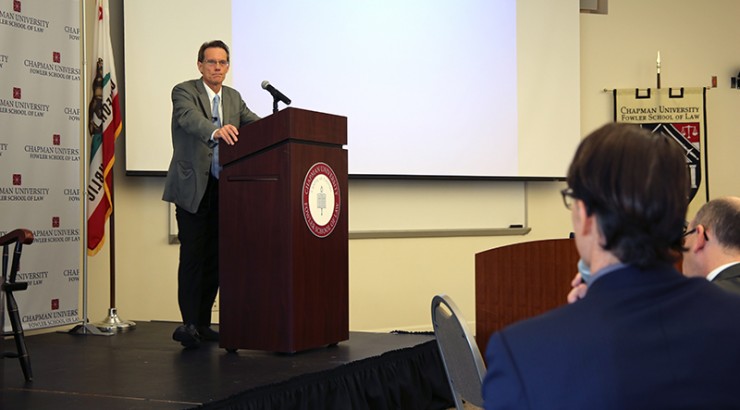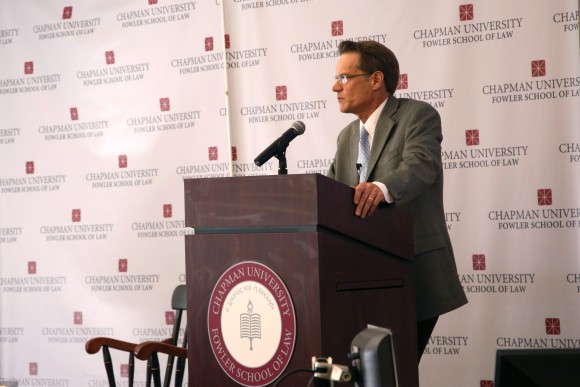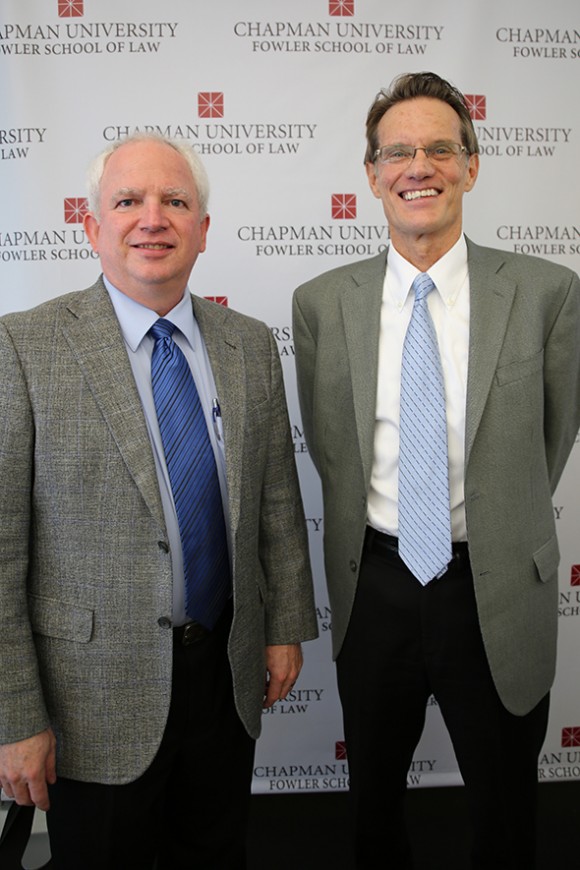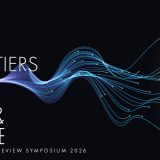
Noted Criminal Law Scholar Christopher Slobogin Takes on Fourth Amendment at Chapman’s First Dialogue of the Year
September 29, 2015
Chapman University Dale E. Fowler School of Law on September 10 welcomed Christopher Slobogin, Milton R. Underwood Chair in Law, Professor of Psychiatry and Director of the Criminal Justice Program at Vanderbilt Law School, as the kickoff presentation for the 2015-2016
Chapman Dialogue Lecture Series
. His presentation, “
Can the Fourth Amendment Survive in a Digital Age?
,” was moderated by Chapman Law’s John Eastman, the Henry Salvatori Professor of Law and Community Service.
The Chapman Dialogues are a special lineup of distinguished lectures by innovative and thought-provoking legal scholars as well as some of the nation’s most prominent legal practitioners. Invited speakers present their research and ideas to a wide audience of faculty, students, alumni and special guests. Each Dialogue concludes with a lively Question and Answer session, typically led by one or two discussants from among the Fowler School of Law faculty.

In his presentation, Professor Slobogin catalogued Fourth Amendment jurisprudence, explaining the differences between physical searches and virtual searches (those searches that do not require physical invasion but instead can be carried out from a distance and covertly). He lamented the fact that the Supreme Court has failed to anticipate (or has fully ignored) the important problems associated with the fit of its precedents to the practice of virtual searches. He identified the primary Supreme Court failure in its complicated and legalistic definition of the word “search.” Professor Slobogin also explained the variety of exceptions, including the assumption of risk doctrine, which places a large amount of information gathering outside of Fourth Amendment scrutiny. As a result of this existing state of the law, most virtual searches go unregulated by the Fourth Amendment.
Given the incomplete and incoherent state of Fourth Amendment law, Professor Slobogin called for reforms leading to a technology-sensitive Fourth Amendment, including a new scheme to regulate virtual searches. Two steps toward accomplishing this goal include: (1) redefining the word “search” to coincide with the lay definition meaning “an attempt to look for something,” thereby capturing both physical and virtual searches under the definition; and (2) implementing the “reasonableness” inquiry with the Fourth Amendment (rather than so heavily relying on “probable cause”) with a proportionality component so that the level of justification required for a search would be roughly proportional to its level of intrusiveness. In the end, Professor Slobogin warned that, “If we don’t modify the Fourth Amendment in some fashion, it’s going to become increasingly irrelevant.”
“It is hard work to find the right legal rules to balance privacy and property preferences with law enforcement and national security necessities. In his Dialogue, Professor Slobogin was up to that task. He tackled the complex search and seizure jurisprudence well, identifying the difficulties involved that – while present since the founding of our nation – have become increasingly complicated with data and other modern potentially-protectable interests in today’s digital age. His cogent analysis gave the nearly 100 students, faculty and staff members in attendance an important primer on the state of Fourth Amendment law as applied to its newest challenges. Professor Slobogin also left all with an excellent framework of policy prescriptions to add much needed clarity – and sensibility – to our meaning of ‘search,’ and the standards law enforcement should follow to ensure that the right balance is drawn between liberty and security in an increasingly complex world.” — Donald J. Kochan, Fowler School of Law Associate Dean for Research & Faculty Development
Christopher Slobogin has authored more than 100 articles, books and chapters on topics relating to criminal procedure, mental health law and evidence. Named director of Vanderbilt Law School’s
Criminal Justice Program
in 2009, Professor Slobogin is one of the five most cited criminal law and procedure law professors in the country, according to the
Leiter Report
. Particularly influential has been his work on the Fourth Amendment and technology and his writing on mental disability and criminal law, appearing in books published by the University of Chicago, Harvard University and Oxford University presses and in journals such as the
Chicago Law Review
,
Georgetown Law Journal
,
Northwestern Law Review
,
Pennsylvania Law Review
and
Virginia Law
Review
. He has appeared on media outlets including
Good Morning America
,
Nightline
, the
Today Show
and
National Public Radio.
He
has also been cited in almost 3,000 law review articles and treatises and more than 100 judicial opinions, including three U.S. Supreme Court decisions.


